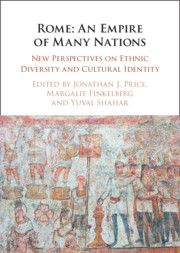Book contents
- Rome: An Empire of Many Nations
- Reviews
- Rome: An Empire of Many Nations
- Copyright page
- Contents
- Figures
- Contributors
- Acknowledgments
- Abbreviations
- Introduction
- Part I Ethnicity and Identity in the Roman Empire
- Part II Culture and Identity in the Roman Empire
- 5 Roman Reception of the Trojan War
- 6 Claiming Roman Origins
- 7 Roman Theologies in the Roman Cities of Italy and the Provinces
- 8 The Involvement of Provincial Cities in the Administration of School Teaching
- 9 Many Nations, One Night?
- Part III Ethnicity and Identity in the Roman Empire
- Part IV Iudaea/Palaestina
- Bibliography
- General Index
- Index Locorum
6 - Claiming Roman Origins
Greek Cities and the Roman Colonial Pattern
from Part II - Culture and Identity in the Roman Empire
- Rome: An Empire of Many Nations
- Reviews
- Rome: An Empire of Many Nations
- Copyright page
- Contents
- Figures
- Contributors
- Acknowledgments
- Abbreviations
- Introduction
- Part I Ethnicity and Identity in the Roman Empire
- Part II Culture and Identity in the Roman Empire
- 5 Roman Reception of the Trojan War
- 6 Claiming Roman Origins
- 7 Roman Theologies in the Roman Cities of Italy and the Provinces
- 8 The Involvement of Provincial Cities in the Administration of School Teaching
- 9 Many Nations, One Night?
- Part III Ethnicity and Identity in the Roman Empire
- Part IV Iudaea/Palaestina
- Bibliography
- General Index
- Index Locorum
Summary
Unlike in the West where the Roman municipal model was almost uniformly spread over the various provinces, Greek cities in the East during the Imperial period were very proud of their own centuries-old political traditions and consequently were reluctant to adopt Roman institutions. However, many cities celebrated the emperor as their ‘founder’ or were renamed after a Roman emperor, such as, for example, ‘Kaisareia’. Other cities deliberately chose pictures referring to Roman foundation practices to appear on their coins (e.g. the plowing scene) or took—formally or informally—the title of ‘koloneia’, normally reserved for communities which were part of the Roman State. This chapter aims at examining which cities were ready to comply with the Roman colonial model, why they did so, to what extent, and what the meaning of their claim for Roman origins was. It argues that the issue of the compliance of Greek cities with the Roman constitutional model of a colony was a way for them to negotiate their position within the Roman empire and was an aspect of cultural interaction.
Keywords
- Type
- Chapter
- Information
- Rome: An Empire of Many NationsNew Perspectives on Ethnic Diversity and Cultural Identity, pp. 100 - 115Publisher: Cambridge University PressPrint publication year: 2021
- 13
- Cited by

